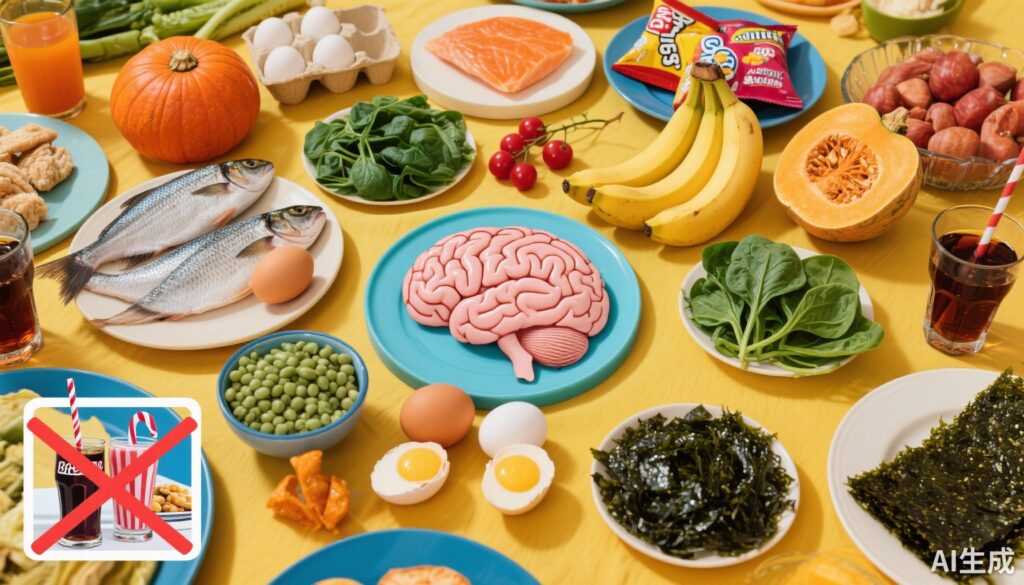Introduction: The Growing Concern Over Brain Health and Diet
As we age, many experience signs of cognitive decline such as forgetfulness, slowed reaction times, and difficulties with concentration. These issues, while common among middle-aged and older adults, are increasingly worrying younger people as well, who fear their mental sharpness may be fading prematurely. What if the secret to maintaining a keen mind lies not in expensive supplements but on your plate?
Emerging research strongly supports that the foods we eat play a crucial role in brain function—impacting memory, attention, and overall cognition. This article explores six accessible, brain-boosting foods commonly found in many kitchens, alongside three deceptively harmful foods you should limit to protect your mental vitality.
Scientific and Clinical Evidence: How Diet Influences Brain Function
Scientific studies have linked specific nutrients to brain health. Neurotransmitters, protective antioxidants, and essential fatty acids depend heavily on dietary intake. For instance, choline—vital for acetylcholine synthesis, a neurotransmitter important for memory—is abundant in certain everyday foods. Omega-3 fatty acids, especially docosahexaenoic acid (DHA), are foundational components of brain cell membranes, influencing neural growth and connectivity.
Research such as Morris et al. (2015) demonstrates that dietary patterns rich in nutrient-dense foods correlate with slower cognitive decline in older populations. Vauzour et al. (2017) further expounds on how specific diets can optimize brain aging, while Gómez-Pinilla (2008) highlights that nutrients act as “brain fuels” affecting synaptic plasticity, energy metabolism, and mental performance.
Brain-Boosting Foods: Common, Affordable, and Effective
Below are six everyday foods with robust evidence supporting their cognitive benefits:
1. Eggs: The ‘People’s’ Brain Food
Packed with high-quality protein, eggs—especially the yolks—are rich in phospholipids, choline, and lecithin, which aid in producing acetylcholine, a neurotransmitter essential for learning and memory. Adequate choline intake, linked to improved cognitive function, may also reduce risks of age-related cognitive decline. Consuming one egg daily can be a simple, economical “brain fuel.”
Practical tips: Boiled eggs, steamed egg custards, or stir-fried eggs with tomatoes retain nutritional benefits and variety.
2. Pumpkin: The Sweet Brain Ally
Pumpkin provides beta-carotene (which converts to vitamin A), crucial for sustaining clear thinking, and vitamin C, an antioxidant that protects brain cells from oxidative damage. Not to mention, pumpkin seeds are zinc-rich “brain minerals” important for child development and adult brain maintenance.
Try making pumpkin millet porridge, steamed pumpkin, or pumpkin pancakes, or enjoy roasted pumpkin seeds as a nutritious snack.
3. Seaweed (Kelp): Nature’s Brain Gold from the Ocean
Seaweeds like kelp and nori are rich in iodine, magnesium, dietary fiber, and natural polysaccharides. Their lecithin and omega-3 fatty acids contribute to nerve cell protection.
Magnesium promotes brain-derived neurotrophic factor (BDNF) secretion, supporting neuronal growth and synaptic plasticity, enhancing memory and learning. Classic dishes include cold kelp salad, kelp and tofu soup, or pork rib stew with kelp.
Note: Due to high iodine content, those with thyroid conditions should moderate intake.
4. Fish: Twice a Week for a Sharper Mind
Many common fish like perch, ribbon fish, yellow croaker, crucian carp, and silver carp contain abundant omega-3 polyunsaturated fats, particularly DHA, known as “brain gold.” DHA supports the brain and retina structure, fostering nerve cell development and slowing cognitive decline.
Regular fish consumption (2–3 times weekly) has been associated with better memory and reduced risk of dementia. Healthier cooking methods include steaming or making soups to preserve nutrients.
5. Bananas: The Brain’s Energy Reserve
A convenient and popular snack, bananas provide glucose and fructose for a steady energy supply to the brain, preventing blood sugar spikes that can impair cognitive performance. They also supply tryptophan, a precursor to serotonin, which improves mood and reduces anxiety.
Rich in vitamin B6 and potassium, bananas aid nerve function and boost concentration.
Ideal for students, office workers, and seniors alike.
6. Spinach: The Green Defender of Brain Cells
Spinach abounds in vitamins C and E, folic acid, and flavonoids—key antioxidants that scavenge harmful free radicals, shielding brain cells from oxidative stress.
Vitamin E specifically reduces fat peroxidation in the brain, supporting nervous system integrity. Including spinach regularly in your diet can delay brain aging.
Cooking tip: Blanch before stir-frying to reduce oxalate content, aiding calcium absorption.
Foods That Harm Brain Health: The Hidden Threats
In addition to nutrient-rich foods, avoiding harmful dietary culprits is equally important:
1. High-Sugar Foods: The Sweet Memory Assassin
Sweet treats like milk tea, cakes, sugary drinks, candy, and preserved fruits offer temporary pleasure but inflict chronic brain harm. Excess sugar causes blood glucose fluctuations that trigger brain inflammation and oxidative stress, damaging the hippocampus—the memory center.
Sustained overconsumption can lead to fatigue, poor attention, accelerated brain shrinkage, and higher dementia risk.
Recommendations: Limit sugary drinks and refined desserts; substitute with fruits or naturally sweet foods like white fungus soup.
2. Processed Foods: The Brain’s Enemy in Disguise
Convenience foods such as ham sausages, instant noodles, spicy snacks, potato chips, high-sodium frozen dumplings, and ready-made sauces are often laden with trans fats, chemical additives, salt, sugar, and preservatives.
Trans fats promote neuroinflammation and impede nerve signaling, while excess salt raises blood pressure, compromising cerebral vessels and elevating stroke and cognitive impairment risks.
Advice: Prioritize fresh ingredients, cook at home, and monitor seasoning levels.
3. Alcohol: The Double-Edged Sword
Even moderate alcohol consumption can harm the brain by crossing the blood-brain barrier, disrupting neuron structures, and impairing memory, judgment, and emotional regulation.
Chronic heavy drinking accelerates brain shrinkage, lowers cognitive functions, and may cause alcohol-related brain disease.
Many believe alcohol aids circulation, but its vascular damage often outweighs any benefit.
Guidance: Abstain if possible; if drinking, keep male intake under 25 grams of alcohol daily (approximately one “liang” of white liquor).
Patient Scenario: Meet David—A Case for Smarter Brain Nutrition
David, a 52-year-old office manager, noticed increasing forgetfulness and trouble focusing during meetings. His diet included frequent sugary snacks, processed fast food, and a habit of daily beer after work. Concerned, he consulted a nutritionist who advised incorporating eggs for their choline, fresh fish twice weekly for omega-3s, and leafy vegetables like spinach.
David swapped sugary sodas for bananas as snacks and reduced processed food intake. After six months, he reported improved concentration and memory, feeling more energetic at work.
This example illustrates the impactful role of dietary changes in enhancing cognitive function.
Expert Insights
Dr. Laura Nguyen, a neurologist specializing in cognitive health, emphasizes: “A balanced diet rich in essential nutrients and low in processed and sugary foods is fundamental to maintaining brain health. The brain’s plasticity benefits hugely from optimal nutrition.”
Nutritionist Michael Chen adds, “Simple food choices like eating an egg daily or including fish can be transformative. It’s about manageable, sustainable habits rather than quick fixes.”
Conclusion: Feeding Your Brain for Life-Long Sharpness
Your brain is not a machine but requires high-quality fuel to function optimally. Instead of chasing supplements, embracing nutritious, affordable foods such as eggs, fish, seaweed, pumpkin, bananas, and spinach offers scientifically backed benefits that support memory, attention, and neural integrity.
Conversely, reducing intake of high-sugar treats, processed snacks, and alcohol protects your brain from inflammation, oxidative damage, and vascular injury.
Start today by choosing brain-friendly foods at every meal, and craft a “brain-protective” diet that keeps your mind clear and memories vivid well into later life.
References
Morris, M. C., et al. (2015). “Dietary patterns and cognitive decline in an older population.” Alzheimer’s & Dementia, 11(2), 144-152.
Vauzour, D., et al. (2017). “Nutrition for the ageing brain: Towards evidence for an optimal diet.” Ageing Research Reviews, 35, 222-240.
Gómez-Pinilla, F. (2008). “Brain foods: the effects of nutrients on brain function.” Nature Reviews Neuroscience, 9(7), 568-578.


